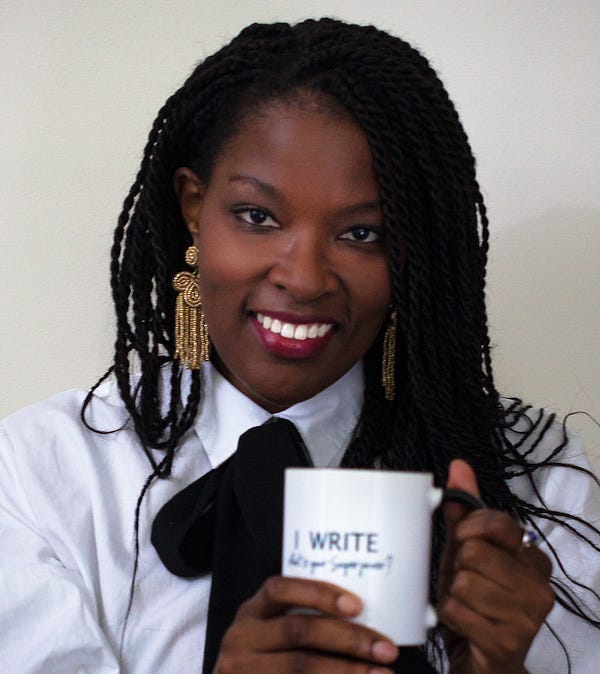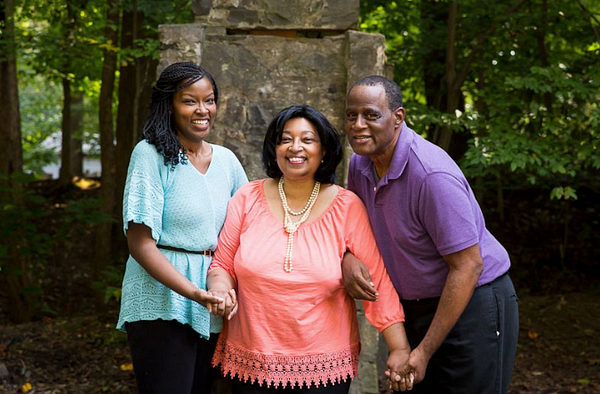As I write this essay, sweat drips from my brow — literally. I am currently sitting on the ravine-facing balcony of my family’s rented condo in Atlanta, Georgia. Eryn Allen Kane’s gripping vocal melodies ooze through my earbuds. The temperature is 96*, with a balmy heat index of 106*. My laptop feels like it’s melting into my thighs, and I slurp down water like a woman marooned on an island. Desperate.
And I guess, in some ways, I am a desperate woman on a metaphorical island of sorts.
I am a 34-year-old caregiver for my mother, who was diagnosed with Frontotemporal Dementia in 2013. The spring of that year, my life took a sharp left turn. I went from being a broke millennial who was excited about landing her first “big-girl” job out of college — dreaming about the future and what might be — to figuring out how Medicare works and implementing mindful touch techniques to help my mom bathe and dress for the day.
Last year, Aisha shared her caregiving story with us. Click here to learn more.
Unlike many of my peers, I am not in a relationship or planning a family. I’m not in line for a promotion at my fancy new startup job. My savings account has a balance of zero dollars and my checking account has little more. There are no after-work happy hours on Thursdays, and there are very few nights out with the girls on the weekends.
I have always loved a challenge and building relationships. In the last six years, I’ve found that hustling in the gig economy as a freelancer and spending quality time with my family have taken priority over fancy titles and Insta-worthy vacations. But this is a mindset that required a reset: jobs and parties may come and go, but I only have one opportunity to be there for the family I’ve been given.
While this epiphany has helped me to cope with the moments when I feel that life is passing me by, the level of desperation remains unchanged. As a caregiver for a person living with dementia, I am in a continuous state of mourning as I watch pieces of my mother slip from the present into the past. The stress of witnessing such a great loss over such an extended period of time, with few people my age who can relate to my journey, is further exacerbated by the lack of financial stability, consistent and quality professional assistance, and accessible and culturally competent support systems.
When I accompany my mother to her neurology appointments or seek out support groups for myself, I notice that there is often a lack of diversity in terms of age, race, sexuality, and class. The failure of current health care systems and support services to acknowledge the need for inclusive programming at all levels and stages of care further isolates a large majority of caregivers who fall into these marginalized groups.
That is why, in 2017, I launched Our Turn 2 Care, an online platform aimed at connecting marginalized millennial caregivers to information, resources, and each other. This venture was born out of a place of personal desperation and the desire to affect positive, measurable change for the 9% of LGBTQ community members, 36% of racial minorities, and 10 million millennials who currently provide care for a parent or loved one in the United States.
Caregiving can be a very lonely experience that feels almost esoteric at times, despite its prevalence and increasing commonality. There is often conversation surrounding the monetary cost of health care for the patient. Policy concepts, like Caring Across Generations’ Universal Family Care, and emerging care support technologies are putting the financial, physical, social, and psychological needs of caregivers.
Stories about caregivers are being highlighted more and more, but here I sit — in the sweltering heat — sharing my story once again. I suffer the heat in a desperate attempt to get some fresh-ish air and create a sense of relative normalcy away from constant reminders of my current circumstances. I sit outside with music streaming into only one ear, the other trained toward the balcony door, attuned to the voices of my parents in the event that my assistance is needed in toileting, channel-changing, or simply reminding her of the month and year.
I am still desperate for peer connection and in need of quality support, but I am keenly aware of this important work that I have chosen to do for my family. Work for which I have not been trained and am woefully under-qualified for but can’t imagine doing anything else because I understand that my family needs someone who is capable of anticipating needs and providing judgment-free, uncompensated comfort and support as they live out the remainder of their lives with agency and dignity — in hopes that I have done my part to help them end well.

Aisha Adkins is a writer, caregiver, advocate, graduate student, and speaker based in Atlanta, Georgia. Aisha became a caregiver when her mother was diagnosed with Frontotemporal Dementia in 2013. Since that time she has become fully engaged in amplifying the voices of young, minority caregivers through storytelling.
As a Master’s of Public Administration candidate at Georgia State University’s Andrew Young School of Public Policy, she has the privilege of assisting with researchers studying the emotional, physical, and social effects of caregiving on vulnerable populations. She plans to earn her Doctorate in the Sociology of Medicine with the intent to help health care organizations and not-for-profit organizations develop and implement more accessible and inclusive treatment plans and support options.
This authentic storyteller is driven by faith, inspired by family, and eager to use her talents to affect positive social change. In 2017, Aisha founded Our Turn 2 Care, a platform connecting marginalized millennial caregivers to information, resources, and each other. Most recently, she is completing a fellowship as an inaugural CARE Fellow with Caring Across Generations. When she is not a doting daughter and agent of change, she enjoys classic film, live music, and spending time outdoors.
